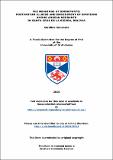Files in this item
The meanings of sobreparto : postpartum illness and embodiment of emotions among Andean migrants in Santa Cruz de la Sierra, Bolivia
Item metadata
| dc.contributor.advisor | Platt, Tristan | |
| dc.contributor.author | Kuberska, Karolina | |
| dc.coverage.spatial | 269 | en_US |
| dc.date.accessioned | 2016-03-31T14:32:59Z | |
| dc.date.available | 2016-03-31T14:32:59Z | |
| dc.date.issued | 2016-06-23 | |
| dc.identifier | uk.bl.ethos.682790 | |
| dc.identifier.uri | https://hdl.handle.net/10023/8524 | |
| dc.description.abstract | This thesis concerns a postpartum condition known as sobreparto among female Andean migrants in the lowland city of Santa Cruz de la Sierra, Bolivia. While sobreparto is a traditionally Andean illness, its occurrence in the lowland city of Santa Cruz opens up new dimensions of analysis. In addition to exposing transformations of the traditional understandings of health, illness, and the body, the study of this phenomenon in an atypical setting sheds new light on issues such as migration, social networks, biomedicalisation, or gender patterns. By means of narratives of lives interrupted by sobreparto, it is possible to locate this condition within a wider frame of life trajectories, exposing motifs beyond the temporarily dysfunctional body. I argue that the narratives of sobreparto can be used as a springboard for a study of transformations in the understandings of motherhood and womanhood, migration and social networks, as well as emotions. Looking at these processes through the lens of a postpartum illness also reveals the connections between the ill body, the troubled mind, and imperfect social relationships. On the one hand, sobreparto can be analysed at the micro-level – in terms of an understanding of the body, individual reproductive histories, or the availability of other people’s support. On the other hand, sobreparto constitutes a commentary on phenomena occurring at the macro-level, such as large-scale internal migration in Bolivia or the increasing domination of biomedicine as a model of health and illness. The city of Santa Cruz offers a unique setting for scrutinising these changes using a traditionally Andean postpartum illness as a point of departure. Being much more than a postpartum bodily dysfunction, sobreparto, therefore, can be used as a lens through which it is possible to see the interplay of social and political macro- and micro-processes in people’s lives at the time of reproduction. | en_US |
| dc.language.iso | en | en_US |
| dc.publisher | University of St Andrews | |
| dc.rights | Attribution-NonCommercial-NoDerivatives 4.0 International | * |
| dc.rights.uri | http://creativecommons.org/licenses/by-nc-nd/4.0/ | * |
| dc.subject | Postpartum illness | en_US |
| dc.subject | Sobreparto | en_US |
| dc.subject | Santa Cruz de la Sierra | en_US |
| dc.subject | Bolivia | en_US |
| dc.subject | Migration | en_US |
| dc.subject | Embodiment | en_US |
| dc.subject | Emotions | en_US |
| dc.subject | Social networks | en_US |
| dc.subject | Childbirth | en_US |
| dc.subject | Loneliness | en_US |
| dc.subject.lcc | GN296.5B7K8 | |
| dc.subject.lcsh | Medical anthropology--Bolivia--Santa Cruz (Department) | en_UK |
| dc.subject.lcsh | Puerperal disorders--Bolivia--Santa Cruz (Department) | en_UK |
| dc.subject.lcsh | Santa Cruz de la Sierra (Bolivia)--Social life and customs | en_UK |
| dc.subject.lcsh | Women internal migrants--Bolivia | en_UK |
| dc.title | The meanings of sobreparto : postpartum illness and embodiment of emotions among Andean migrants in Santa Cruz de la Sierra, Bolivia | en_US |
| dc.type | Thesis | en_US |
| dc.type.qualificationlevel | Doctoral | en_US |
| dc.type.qualificationname | PhD Doctor of Philosophy | en_US |
| dc.publisher.institution | The University of St Andrews | en_US |
The following licence files are associated with this item:
This item appears in the following Collection(s)
Except where otherwise noted within the work, this item's licence for re-use is described as Attribution-NonCommercial-NoDerivatives 4.0 International
Items in the St Andrews Research Repository are protected by copyright, with all rights reserved, unless otherwise indicated.


